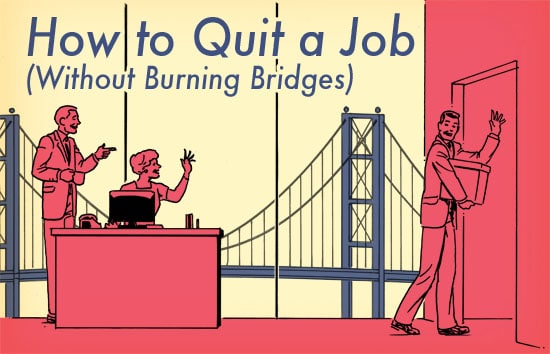Quitting a job can make a man surprisingly anxious. The roots of the anxiety are myriad:
- Maybe you’ve never really quit a job before. You always had a built-in out. “Well, school starts again and I’m heading back to college.”
- Maybe the company just hired you a few months ago and you feel kind of bad about making them go through the hiring and training process all over again.
- Maybe it’s a small company, you’ve been there a long time, are close to your boss and co-workers, and feel like you’re leaving them in the lurch.
- Maybe your boss is a tyrannical hothead (that’s why you’re quitting!), and you wonder how he’s going to react when you tell him.
Any way you slice it, when you’re quitting a job, you’re sort of firing your employer. It’s somewhat comparable to breaking up with someone. And just like with breaking up with a girlfriend, there’s a right and wrong way to do it.
The wrong way is to burn your bridges and leave a bad taste behind.
The right way is to resign with grace and dignity, demonstrating that you’re a man of respect and value until your very last day on the job.
Despite all the talk you hear about living in a globalized society, the working world is a surprisingly small place. And whether you’re leaving your current position for another company, or going into business for yourself, you never know when you’ll be working with, asking a favor of, or needing a recommendation from a former boss or co-worker. And don’t forget about gossip. How you leave, especially if it’s in the negative, will be sure to reach many more ears than just those whom you used to work with. Indulging your short-term desires to Jerry Maguire your way out of a job can lead to some seriously detrimental effects down the road.
To quit a job with your bridges and dignity left firmly intact, follow the tips below. They’re based on research, personal experience, and an interview with Mugs Buckley, a colleague of mine and Vice President of Sales Development at Federated Media Publishing in San Francisco.
Wait. First, Be Sure You’re Quitting at the Right Time and for the Right Reason
Before we get into how to quit a job, it’s important to make sure you’ve thoroughly thought through the reason you’re leaving, and that the reason is a good one. Mugs advises that you ask yourself a very wise question:
When people talk to me about leaving a job, I ask them if they’re running from their current situation or running to the one they’re considering. If they’re running from, I counsel them to weigh the pros and cons of the new situation. What does the new job solve that you’re not getting in your current situation? It may solve a key complaint such as compensation, an undesirable boss, or a job function that they disdain, but how much better is the new situation? If it’s much better, weighing the cons of the new situation, then it sounds like it’s a better situation than their current one. Go for it. But if it solves one key complaint but introduces another, then it seems more often than not that the person may be replacing one problem for another one. ‘Running To’ answers are easy: take the job. ‘Running From’ answers need to be carefully considered before quitting your current role.
As far as timing goes, I would add that I’m personally of the opinion that you should almost always have a concrete offer in hand from a new employer before you quit your old one. This goes for leaving a job to start your own business as well. Make sure you can show three to six months of a revenue stream that you’re comfortable with. There are definitely situations where you just have to throw caution to the wind and go for it, but that’s not necessary as often as people who hate their day job wish it was. I’m a huge proponent of moonlighting with your side hustle until it’s become big enough that you can comfortably quit your day job. That’s how I went from corporate guy to full-time blogger.
Be sure to listen to our podcast on whether or not you should change careers:
Made Up Your Mind? Here’s How to Quit a Job
Give two weeks’ notice. Your contract or company handbook may specify how much notice you need to give, but if not, two weeks is the standard. Your employer needs time to process your departure, start looking for someone else, and plan for as smooth a transition as possible.
It’s true that at a big corporation, once you put in your resignation, they may immediately and unceremoniously escort you out the door. It’s also true that many companies, although they ask you to give them early notice of your resignation, would not afford you the same privilege when giving you the boot. This leads some to adopt the attitude of, “F that! I don’t owe them anything! I’ll quit and walk away the same day.”
Personally, I don’t let my behavior and values be dictated by others. I treat people with the respect I would wish to be treated with, regardless of whether they would reciprocate. My code isn’t based on tit for tat. Even if your boss is a chump, and your company a hellhole, jumping ship without notice will often greatly add to the burdens of your fellow employees, who will have to scramble to cover your responsibilities and figure out how to tie up your loose ends. That’s your job, not theirs. So out of respect for your colleagues, if nothing else, put in your two weeks’ notice.
Tell your boss before anyone else. No matter how much you trust your colleagues to keep a secret, don’t let it slip to them by the watercooler that you’re about to bounce. Also be careful about announcing things on social media before you give notice – basically, don’t do it. These things invariably have a way of getting back to the corner office, and no boss wants to hear about your departure through the grapevine. And you definitely don’t want to hear him say, “I know,” when you finally tell him. Once you decide to quit, inform your immediate supervisor first, your co-workers second.
Always have the conversation in-person, unless circumstances make that impossible. As Mugs advises: “Deliver your news in person or via phone. It’s best to schedule an in-person meeting with your manager to deliver your news, assuming you work in the same office. If you don’t work in the same office, then it’s best to talk via phone. Emailing them is a last resort unless logistics are such that you’re both unable to talk on the day you want to deliver your news. But don’t wimp out and email them. A conversation is always best.” Just as a respectable man wouldn’t break up via a text, don’t break up with your company via email.
Be prepared for the conversation. There are a few things you should think through before you meet with your boss to let them know the news.
Do you have a transition plan? Nobody knows better than you what projects need to be wrapped up and what responsibilities need to be taken over. Come into your boss’ office with a concrete transition plan that you can share, and with a pledge to take a hands-on role in smoothly passing over the reins.
What will you do if they make a counteroffer? You need to be prepared for your boss to entice you to stay on with promises of new benefits or responsibilities. Think through as many as these possibilities as you can before you talk to him or her, so you’re not caught flat-footed. Would you stay for an extra $5,000? $10,000? An additional week of vacation? You don’t want to be flustered and find yourself saying yes because he’s being so nice and generous, and you have tough time telling people no to their face. If there are circumstances in which you’d stay on, be crystal clear going in on what things would need to change and don’t budge unless those specific promises are made (and in writing). If nothing will change your mind, simply tell your boss how much you appreciate the kind offer but that the new opportunity is something you just can’t pass up.
If you do find yourself seriously contemplating the counteroffer, Mugs advises thinking over some important considerations:
If your current employer counters your new offer and wants to keep you, you need to go back and ask our first question again: Are you running to something or running from something? If they offer you more money in your current situation, will that solve your complaint and how long will that satisfy you? Also, if you’ve already committed to your new employer, then you’d be dealing with rescinding an offer that you’ve presumably already accepted. You need to consider your reputation carefully. In my experience, countering a current offer rarely works unless the situation radically changes, including job function, reporting structure, and/or increased compensation. And is it worth ruining your reputation with your would-be new employer that’s going to feel burned that you wasted their time and effort? This is a very delicate situation. Consider your move very carefully here.
Are you willing to stay longer if asked? Your boss may ask you to stay on a week or two longer for more help in wrapping things up. Is this a possibility for you? Even if it is, is it something you’re willing to do? Again, make sure you think through this question beforehand, so you don’t get guilted into something in the moment.
Are you ready to go home today? If your boss tells you that you need to leave immediately, are you going to be able to gather up all your personal belongings and get out of dodge, or is your stuff scattered all over the office? Once you pass through the exit doors, they may not let you back in to get something you forgot.
Keep the conversation concise and positive. When going to speak with your boss, get to the point. You don’t have to tiptoe around the issue and chit-chat for ten minutes first. You also don’t have get into the specifics of your new gig. It’s okay to just say, “It’s an offer I can’t refuse, and I’m giving my notice effective immediately.”
If you were unhappy in your job, it may be tempting to use the quitting conversation to unload all of your pent up frustrations on your soon-to-be former boss. This is decidedly unwise. Instead, strive to be kind and courteous when delivering the news. As Mugs counsels:
“Take a ‘no scorched earth’ approach. Even if you feel like giving your manager a piece of your mind, save it unless it’s constructive. You don’t need to flame anyone on the way out the door, either your manager or your colleagues. The world is too small and most likely you will run across your manager and/or your former colleagues again at some point in your career, and it’s best to not be ducking because you had disparaging things to say about people during a period when you were heated. Take out the emotion when discussing why you’re leaving.”
Thank your boss for the opportunity, and if she asks why you’re quitting, simply emphasize something about the way in which your new job aligns better with your key interests than your current one does. “I’ve always wanted to do more teaching, and in my new job, that will be the biggest part of my responsibilities.” If there isn’t a reason like that to give (maybe you’re just jumping ship because of the downer culture of your current company), just tell your boss (and this goes for your colleagues too) something positive and general like, “I’m ready for a new kind of challenge” or, “This is a better opportunity for me.”
Ask about the nitty-gritty details. Alison Doyle from About.com states this succinctly: “Find out about the employee benefits and salary you are entitled to receive upon leaving. Inquire about continuing health insurance coverage through COBRA (Consolidated Omnibus Budget Reconciliation Act), collecting unused vacation and sick pay, and keeping, cashing in, or rolling over your 401K or other pension plan.”
Write a formal resignation letter. This isn’t required at all jobs, but after you verbally tell your boss the news, you’ll often be asked to submit a formal resignation letter. This letter is for your records and theirs, so don’t write anything that might come back to haunt you. Keep it brief and professional and stick to the facts. There’s no need for explanations for your departure — simply state that you’re leaving, and when your last day will be.
Don’t get “trunky.” When I was on a two-year mission for my church, once a missionary approached the last few months of his service, he’d often start to get “trunky” – the term we used for figuratively having one’s bags packed, and mentally starting to check out.
It’s easy to get trunky once you’ve put in your two weeks’ notice at a job. But it’s important to dig in and finish strong. Not only is your company still paying you, but you want to leave on a high note. First impressions get a lot of emphasis, but psychologists have found that people remember best both the first part of an experience and the last part– which is to say your final two weeks will constitute much of what your former colleagues remember about you.
Don’t start any new projects during your last two weeks, but do all you can to tie up loose ends. Fill in your colleagues about where any open projects stand, where you left off with XYZ, and where they can find your documents and files. Ask them how you can help them out in your transition. Leave the company in as good a shape as possible. Make them sad to see you go, and hoping you’ll cross paths again someday.
Don’t blast your former employer on social media. Once you walk out the door of your former office the last time, you might want to get on Facebook to write up a status update about how thankful you are to be done with that soul-sucking job and your old meatball-for-brains boss. I’ve seen people do this. Don’t give into the temptation. Stuff like that very easily gets around, and it not only looks bad to your former colleagues, but raises red flags for your future ones too.
Say a warm goodbye and thank you to colleagues. Assuming there were a number of people you did truly enjoy working with, take the time to tell them farewell. An attitude of gratitude is an important character trait to develop. And in an age when who you know is more and more important in getting ahead, building and strengthening your network is paramount.
It’s fine to send out a mass email to all your colleagues and clients to let them know you’re leaving (no need to explain why) and to pass along your personal contact information (email, phone, LinkedIn profile). But you should also write a personal note, perhaps of the handwritten variety, to key and favored individuals. Mention the past projects you did together that you enjoyed, share your appreciation for them and their personal qualities that made your job easier and more enjoyable, and tell them that you hope to keep in touch.
________
Illustration by Ted Slampyak
Thank you to Mugs Buckley for taking the time to offer some great advice.








